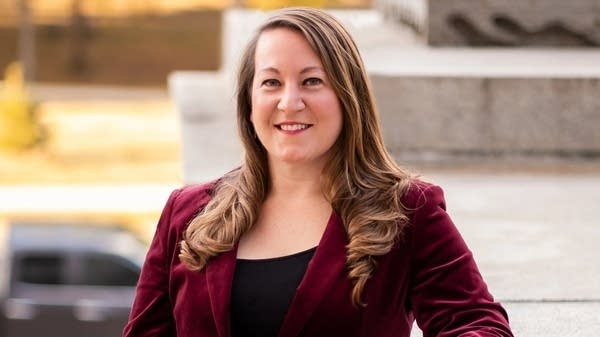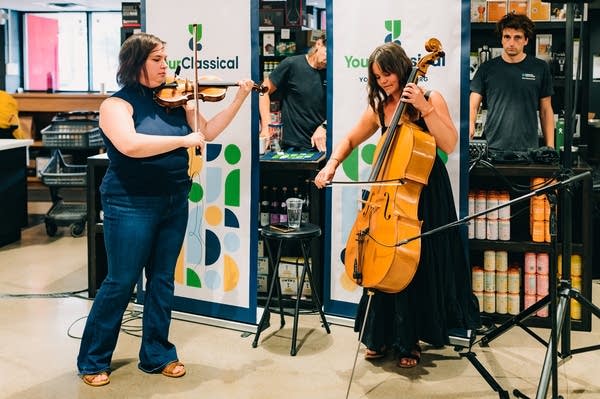When he makes his Minnesota Orchestra debut this weekend, violinist Benjamin Beilman will be bringing his 1709 Stradivari, a rapidly burgeoning professional reputation, and the score to a fiery concerto that has somehow fallen out of favor.
That concerto is Camille Saint-Saëns' Third. Once a mainstay of the orchestral repertoire, it now tends to be perceived as a mere stepping stone to bigger works, and it is heard more often in student recitals than in concert halls.
Beilman thinks it deserves better.
"I will readily admit that the bulk of the spotlight in this Saint-Saëns concerto goes to the solo violin," he says, "but there are plenty of genius touches in the structure and pacing."
He points to a specific moment in the famously lyrical slow movement, where the violin plays whistly notes (known as harmonics) in conjunction with the clarinet.
"The orchestration at the end of the second movement is so incredible!" he says. "If you practice these arpeggiated harmonics on your own, you feel so idiotic. But in the context of the piece with the clarinet, it's absolutely genius."
Beilman first encountered the concerto as a 13-year-old student, when he played it with piano accompaniment in his teacher's studio class. After that, he shelved it for more than a decade. He only had his first chance to play it with an orchestra in 2015, when a conductor specifically requested it.
"At first, I wished I could have performed one of the heavy hitters like Sibelius or Brahms," he says, "but after diving in with fresh eyes, I saw so much more in the piece. Since then, I perform it two or three times a year, and I always push for it when I can suggest repertoire."
It seems fitting to hear Beilman advocating for a piece so beloved by earlier generations. Despite his age, 29, his playing often comes across as that of an old soul. New Yorker music critic Alex Ross labeled him "eerily mature" in 2009, when he was just 19.
His musicianship was partly shaped by a childhood spent listening to recordings by Fritz Kreisler, Nathan Milstein, Oscar Shumsky, and Arthur Grumiaux — all so-called Golden Age violinists who were born in the late 19th or early 20th centuries.
"It's through their playing that you learn how to express music from that era," he says. "Just as a movie set in World War II would dress the actors in appropriate uniforms, we have to change our inflection to match the time in which the music was written."
Do lessons learned from those old recordings extend to how he interprets Romantic-era works like the Saint-Saëns?
"I'm not at all a pedant for 'historically informed' playing styles that ignore personal style," he says, "but I do think we have to see music that wasn't written in our lifetimes through a different lens."
Beilman began his violin studies at 5. He moved frequently as a child, but by the time he reached high school, his family had settled in Ann Arbor, Mich. Every weekend, he and his father took the 4½-hour drive from Michigan to Chicago to study with the legendary husband-and-wife violin teaching team Almita and Roland Vamos. The dedication paid off, and he was ultimately accepted into the ultra-exclusive Curtis Institute in Philadelphia.
He garnered attention even as a student, winning the first prize at the Montreal International Musical Competition in 2010 and the Bronze Medal at the 2010 International Violin Competition of Indianapolis. Ever since, his career has been on a steady upward trajectory, and he now solos with orchestras around the world.
His traveling companion is a 1709 Stradivari violin known as the "Engleman," which he has played for the past three years. He feels that its special traits help him to express his musical ideas as clearly as possible.
"The top register on this violin is superhuman," he says. "In the same breath, it can go from the supplest falsetto to brassy and gargantuan."
Such a flexible instrument is uniquely suited to his approach to music. Although Beilman might be in a relatively early stage of his career, he has clearly been thinking about the philosophy behind his job and the art.
"I try to illuminate each composer's unique voice," he says. "I want to be the perfect frame for each masterpiece, not to splash a huge gaudy signature on the canvas."
Love the music?
Show your support by making a gift to YourClassical.
Each day, we’re here for you with thoughtful streams that set the tone for your day – not to mention the stories and programs that inspire you to new discovery and help you explore the music you love.
YourClassical is available for free, because we are listener-supported public media. Take a moment to make your gift today.









